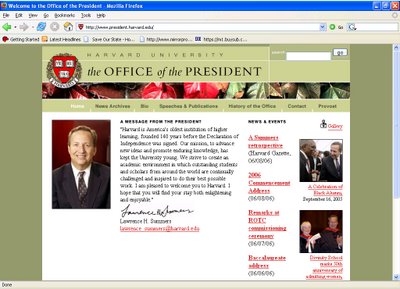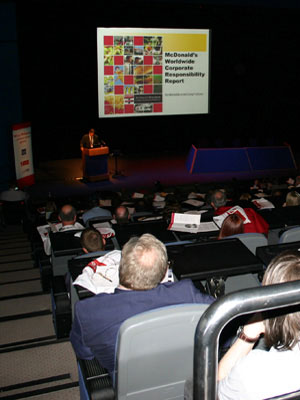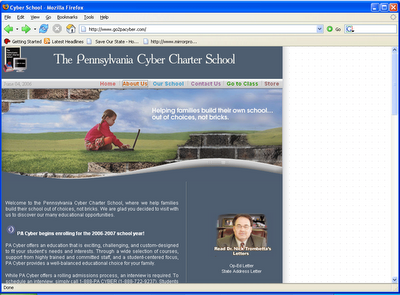Today is the one-year anniversary of the
Virtualpolitik blog. The
first entry was about a change in the visual rhetoric of several government websites. Over two hundred and thirty postings later, there is still plenty of digital rhetoric to write about.
In honor of the occasion, I already gave myself my birthday present, a 60GB
Apple video iPod. Unfortunately, only a few hours later, I learned about the
Chinese sweatshops where it was made from
BoingBoing.
It's a good time to be blowing out candles on the cake, because the
Yearly Kos Convention has brought fresh political attention to the blog genre this week from the news media. As a force for the dissemination of political opinion, an article in
The New York Times said that blogs were for the left what talk radio was for the right (an analogy that I don't quite agree with). Furthermore, as bloggers refine their style in ways unlike conventional literary journalism, it's worth looking at the
Habits of Highly Effective Bloggers.
In the spirit of full disclosure, I'll post the rules that I set for myself in the beginning, which I believe I've never done here before:
1) The post must analyze the rhetoric of a specific digital genre (website, videogame, database, e-mail, blog, PowerPoint presentation, etc.).
2) The central issue must be "political," at least in the sense that it deals with ideologies about power and technology or the conflict between the interests of institutions of knowledge -- such as government agencies or universities -- and discourses of information, represented by communication via hypertext, distributed networks, computer generated simulations, databases, or "code" divorced from natural language.
3) It must respond to the
Zeitgeist or spirit of the moment in some way (although areas of suspicious inactivity can also be signficant for "newsiness").
4) There must be interesting links for readers to follow.
5) There must be something new for every day, even if entries are delayed in posting (because I am in the
middle of the ocean, for example).
6) To impact public policy, it must aim to express and inspire genuine sentiment, ideally in the form of peals of laughter, groans of rage, sighs of pleasure, etc. (For example, this reader who said an entry made her want "
to vomit" had the general idea of what I aspire to.)
Of course, I've broken these rules from time to time. And I don't always go with conventional wisdom about effective promotion. For example I ditched both
descriptive titles and generic metadata tags after short-lived experiments with paralyzing boredom.
Before I make my wish, I'd like to thank those who were so generous by linking to this blog. The list includes
Sivacracy,
Water Cooler Games,
Design Your Life,
John Brown's Public Diplomacy Review,
Spare Change (a social marketing blog), and
BlogHer: Research and Academia. They were excellent presents, very considerate and always the perfect size.
Like every birthday girl, I enjoy getting cards as well. So I'm grateful for the dialogue generated by comments. After criticism that might have merited hate mail from the less rhetorically savvy, I got constructive feedback from many readers who had found that their public personae or ideas had been skewered here.
Walt Crawford,
Mark Boardman,
Craig Lefebvre, and
B. J. Fogg showed that they could be good sports. And even those behind
Iraq the Model were extraordinarily civil.
As if there weren't enough icing on this birthday cake, blogging has totally changed my approach to academic writing. In previous years, my publications -- even about public policy issues that directly impacted access to digital resources by average citizens -- were aimed at niche audiences in higher education. It would have never even occured to me to write something that personal friends who were
astrophysicists or
screenwriters would enjoy. But after giving a
paper on a military-funded videogame at a conference, and seeing its reception in the blogosphere, in collaborative web spaces like
WRT: Writer Response Theory and
Grand Text Auto, I began to see the public role of academic conversations in a new way.
I've even scrapped the original opening to the
Virtualpolitik book manuscript to go with a
bloggier introduction, which is still very much in process. (Please do not cite this text, however, as it is still essentially a long, unedited sketch with no scholarly notes.)
So, here goes: WHOOOOOOOOOOOOOOOOOOOOOSH!
And now, back to our regularly scheduled rhetorical analysis.
(If you just wandered onto this page, because you were thinking of buying a 60GB iPod and were looking for user reviews, I apologize for your inconvenience. But please, before you leave, take a piece of cake. Guests should feel welcome. If you are still hungry, you can see what's in the refrigerator by clicking on the "Classic Virtualpolitik" entries on the right.)
Labels: Apple, e-mail etiquette











